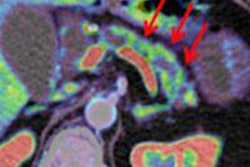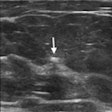CT-guided irreversible electroporation (IRE) is safe and effective for patients with locally advanced unresectable pancreatic carcinoma, according to a study presented at this week's American Roentgen Ray Society (ARRS) meeting.
Researchers from Naples, Italy, and New York City found that the nonthermal ablation technology was successful in all five patients who underwent the procedure.
The study aimed to evaluate the safety and efficacy of IRE as a treatment for locally advanced pancreatic cancer. One woman and four men (median age, 60 years) with advanced unresectable pancreatic adenocarcinoma underwent percutaneous IRE ablation using CT guidance (Aquilion One, Toshiba Medical Systems) and the NanoKnife tissue ablation system (AngioDynamics).
The researchers looked at morbidity, mortality, and local disease control after the procedure, following up with contrast-enhanced CT at one, two, and three months on three patients and at one and two months on two patients. The patients suffered no major ill effects -- either pancreatitis or fistula formation -- after undergoing CT-guided percutaneous IRE.
The early results indicate the procedure is a good alternative to intraoperative IRE ablation, and that it's safe and feasible for locally advanced pancreatic cancer, said lead author and presenter Dr. Maria Paola Belfiore, from Second University of Naples, in a statement.



















